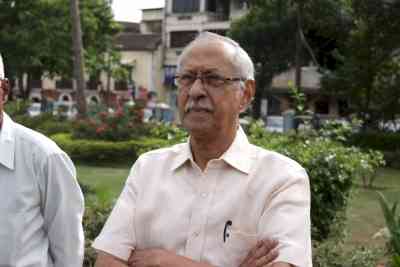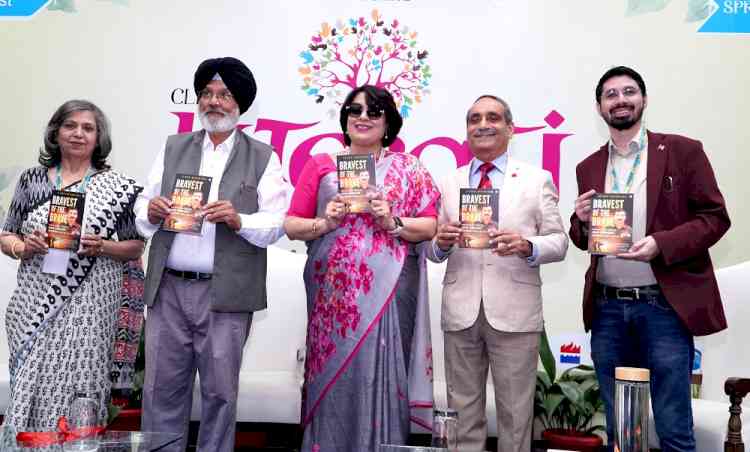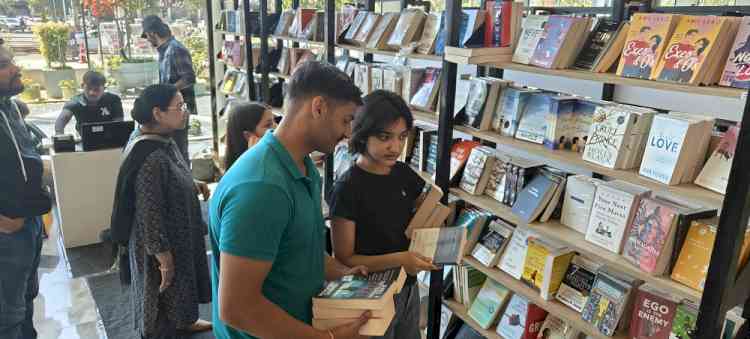Writers can't become cheerleaders of those in power: Jnanpith awardee Damodar Mauzo
If writers write to please the dispensation and become cheerleaders, then it would be harmful to society, said Jnanpith awardee Damodar Mauzo, also known for championing the cause of freedom of expression.

SANJAY BORKAR
Panaji, Dec 29 (IANS) If writers write to please the dispensation and become cheerleaders, then it would be harmful to society, said Jnanpith awardee Damodar Mauzo, also known for championing the cause of freedom of expression.
"We need to respect our diversity. We can't ignore the fact that many members of the minority community have fought for the independence of our country. We need to work in unity to achieve the progress of India. We will not become 'Vishwa Guru' just by raising slogans and giving speeches. The need of the hour is to acknowledge and preserve the supremacy of freedom of expression and stand up for our constitutional fundamental rights," added Mauzo, who's best known for his Konkani novel 'Karmelin', which won him the Sahitya Akademi Award in 1983.
Known for his progressive writings, Mauzo has been provided with security cover, since 2018, following intelligence inputs from the special investigation team probing the murder of journalist-activist Gauri Lankesh in Karnataka about a threat to his life.
Speaking to IANS, the author said that he is not afraid of fringe elements that killed the bold journalist, Gauri Lankesh. "They are cowards who are scared of liberal, progressive and rational fundamentals. I am not afraid of them," he said.
"It is unfortunate that many writers fear to take cudgels against the wrongdoings of those in dispensation. Such spinelessness can cause a lot of harm to society. We see what is happening in other countries. The forthright voices are muffled by the repressive forces in countries like Mynamar, Afghanistan, Russia and also in parts of Europe. We do not want this to happen in our country.
"It seems most of the writers prefer to be in good books not only with those in power but also those harmful and divisive elements in society. As a writer, I feel it is our bounden duty to strive to do away with injustice, if any, meted out to our fellow countrymen. What we want is to lead society to live with dignity," Mauzo added.
To a question if it would be right to hold politicians responsible for "the rising religious hatred", Mauzo said that "it is true and we all know it, though not all politicians are in the same boat".
"What irritates me is that our elected representatives are leaping from one party to another, where the ideology is totally different, thus betraying the trust of the people. Such chameleon politicians hoodwink the electorate. It is unfortunate that people do not react strongly," he said.
Lambasting politicians who work in the interest of their party agenda have made people dependent on them.
"The institutions, who get the government's financial support for their activities, should not compromise their ideology. My concern is that people are stooping to get what is due to them. No one in Government should take advantage of this weakness of the people to keep them obliged," he said.
Mauzo went on to note that freedom of speech has always been under attack in the past as well. But, because of consistent pressure from intellectuals, the governments were forced to exercise their prudence.
"Of late, however, the government finds that almost all are saleable commodities. This is a dangerous situation for any country, any society. Today, seemingly, the government is misusing the ED, CBI and other government agencies to quite the voice of people.
"It is the responsibility of writers to make people aware of the implications, not through preaching, but through our convincing writings. It does not mean that we have to criticize the government on every count. We are also obliged to appreciate the good moves made by the government," he said, adding that the revocation of Article 370 in Jammu and Kashmir was a good step, "though its intention and implementation can be questionable".
Speaking about the menace of casinos, drugs and dance bars in Goa, Mauzo said that such things can't happen unless there is patronage from some bigwigs in power.
"When people opposed casinos in Goa, anticipating that they would spoil the moral fabric of Goan society, the government made a rule that locals will not be allowed in casinos. Who can believe this will help?" he asked.
Mauzo, who stays 10 metres away from the railway route from where the coal is transported, said that such decisions by the government have suffocated nature and environment.
"Coal is transported from in front of my house by railway. My newly-painted house turned blackish with a layer of coal dust within six months. The plant leaves you will see coated with coal powder. I don't know how much coal powder has gone into my lungs. Such damage has to be prevented,.
"They are not using closed wagons fearing the friction will lead to combustion. Thus, they only cover the wagons with tarpaulins. Our environment and nature is getting damaged due to this coal transportation. As the government is in majority, it seems, they don't care about our voice," he said.
Recalling his childhood days when commuting to school from Majorda to Margao by Western Indian Portuguese Railway, he said: "Only two passenger trains were on route then. But because the goods trains that moved mining ores were given priority, passenger trains invariably were delayed. Hence, one fine day, the regular commuters met the authorities to complain about the irregularity. The Portuguese colonial authorities then bluntly told the commuters that they didn't care to operate passenger trains on time. They gave priority to goods trains because they fetched better revenue, they openly claimed.
"They were colonial rulers, there was no democracy then. Today ours is a democracy. We are liberated but still why our voice is scuttled?"
Dwelling on freedom of expression, Mauzo said: "As writers, we have a hard time. We find it difficult to find publishers. Writers are hardly ompensated, leave aside rewarded. If a good artistic book which may not suit the taste of certain fundamentalists, it is not likely to get a publisher."
He concluded on a note of hope, saying: "Yet, I am optimistic that we WILL see a better time. We have to be vigilant, alert and brave enough to oppose anything that is not in the interests of society."


 IANS
IANS 







